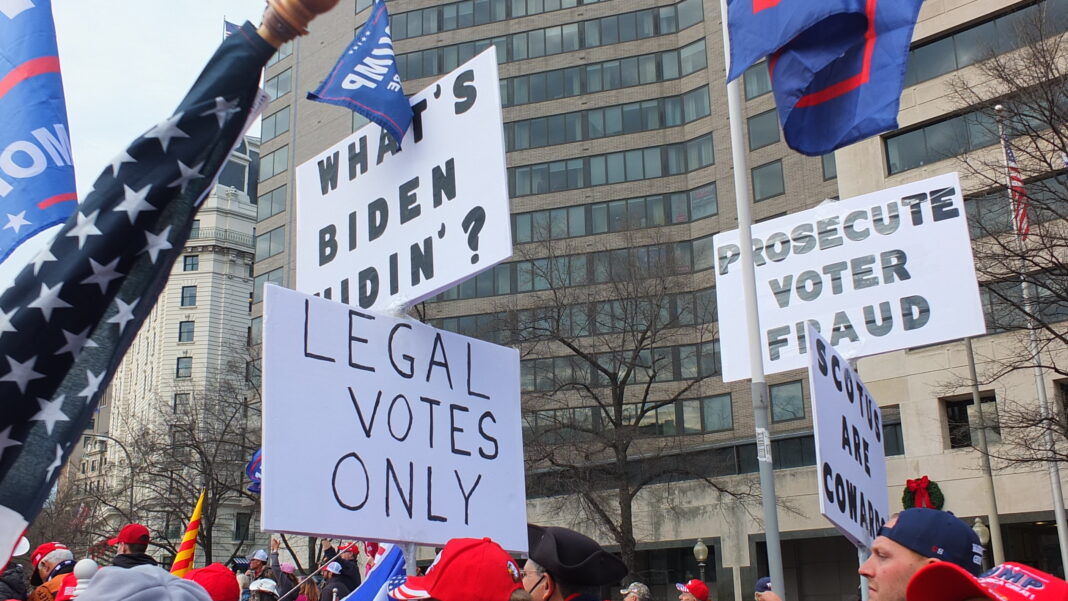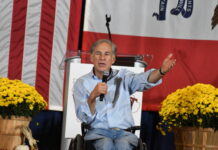By Hannah Davis
FAIR
On Election Day, voters in Iowa, Kentucky, Missouri, North Carolina, Oklahoma, South Carolina, and Wisconsin approved ballot measures to amend their state constitutions to ensure that only American citizens vote in elections. These measures follow the lead of states that took similar action in recent years such as Alabama, Colorado, Florida, Louisiana, North Dakota, and Ohio.
Iowa
Iowa voters overwhelmingly approved a constitutional amendment to ban noncitizen voting with 76 percent support. The specific language adopted by Iowans alters the state constitution’s language from “Every citizen of the United States…shall be entitled to vote” to “Only a citizen of the United States…shall be entitled to vote.”
The amendment, which was placed on the ballot with bipartisan support from the Iowa Legislature, was backed by advocates such as Jack Tomczak, Vice President of Americans for Citizen Voting. Tomczak argued “Without this constitutional amendment, there is a path for cities to take to legalize noncitizen voting. If our amendment passes, they would have to amend the constitution to make that constitutional.”
Noncitizen voting recently became an issue in Iowa after Secretary of State Paul Pate identified over 2,000 registered voters in Iowa who may not be U.S. citizens. These individuals had indicated to the Department of Transportation that they were noncitizens.
Kentucky
Kentucky voters approved a state constitutional amendment to explicitly ban noncitizen voting with 62 percent of the vote. Amendment 1 revises Section 145 of the state’s constitution to read, “No person who is not a citizen of the United States shall be allowed to vote in this state.”
Leading up to the election, opponents of the measure, such as Rep. Nima Kulkarni (D-40), who also serves as the Executive Director of the New Americans Initiative, argued that the amendment unfairly targets immigrant communities and promotes misleading narratives. In contrast, proponents argued the amendment is a preventative measure to safeguard election integrity. State Rep. Michael Meredith (R-19) emphasized that lawmakers would be “proactive with this amendment,” addressing potential issues before they arise in Kentucky.
Kentucky Secretary of State Michael Adams clarified that the amendment is intended solely to remove legal ambiguity. “The amendment would not in any way change the mechanics of the election,” he said. “It would not change the voter experience. It would not create any new obligations on voters’ part. All it would do is clarify law, because the language in our constitution is somewhat indirectly written, and it implies, but does not outright state, that noncitizens cannot vote in Kentucky elections. It says that every citizen can vote, but it doesn’t say that the noncitizen can’t vote,” Adams explained.
Missouri
Missourians approved a ban on noncitizen voting with 68 percent support. Constitutional Amendment 7 (SJR 78) changes the text of the state constitution from “All citizens of the United States” can vote to “Only citizens of the United States” can vote. This amendment aligns Missouri’s constitutional language with existing state law, reinforcing that only U.S. citizens have the right to vote.
As Election Day approached, it was clear that the measure had wide public support. One prescient poll in September showed that 68 percent of Missouri voters supported banning noncitizen voting. The Republican candidate for Governor (now Governor-Elect), Mike Kehoe, also endorsed the measure, stating, “Immigrants who lawfully become naturalized citizens have worked very hard to achieve their right to participate in our elections. I’m proud to support this commonsense measure because it respects the efforts of countless individuals who truly understand the gift that it means to be an American citizen.”
Like Kehoe, State Treasurer Vivek Malek, supported the constitutional amendment. He said, “I am a first-generation American, and I worked hard to pursue the American Dream and earn the opportunity to become a citizen. The right to vote and participate in our elections is fundamental to our republic, and that is why we need to pass the Only Citizens Vote and Only Vote Once Amendment.”
Not all Missourians favored the amendment. Earlier this year, two voters filed a lawsuit arguing that the ballot language was misleading, but a Cole County judge dismissed the suit. In an 11-page decision, the judge ruled that the language “is not untrue or partial, and it does not use language that is intentionally argumentative or likely to create prejudice.”
North Carolina
Voters in North Carolina overwhelmingly supported a ballot initiative to ban noncitizen voting by 78 percent. The amendment rewrites the language of the state constitution from “Every person born in the United States and every person who has been naturalized…shall be entitled to vote” to “Only a citizen of the United States…shall be entitled to vote.” This change removes the word distinction between where voters were born, which had sparked debate across the state.
Democracy NC, a prominent opponent of the amendment, argued that changing the constitution could foster division and discourage voter participation. It asserted that the amendment “sows division across communities, creates mistrust in our elections, and perpetuates anti-immigration hate and racism.” However, supporters of the measure, which passed with bipartisan backing in the state legislature, continued to advocate for it as a safeguard for election integrity.
Jason Simmons, chair of the NC Republican Party, views the amendment as essential for protecting fair elections, stating, “Individuals across the state are concerned with the electoral process, and they want to make sure that the votes counted are legal votes.” Dr. Andy Jackson, director of the Civitas Center for Public Integrity at the John Locke Foundation, similarly supported the amendment, arguing that it clarifies the law. “We already have a statute that says only citizens can vote, but the problem with that is sometimes judges can be creative in their interpretation of the statute and what is constitutional or not constitutional. So, our idea is that we want to have unequivocal language in the constitution that only citizens can vote in North Carolina.”
Oklahoma
Oklahomans approved a ballot initiative to ban noncitizen voting by 81 percent. State Question 834 amends Section 1 of Article III to replace “All citizens of the United States” with “Only citizens of the United States” are eligible to vote. The change aligns the constitution with state law that provides non-citizen voting is a felony offense.
The ballot initiative almost didn’t reach the voters, only passing the very last day of the legislative session. State Senator Shane Jett (R-17) noted that getting the measure on the ballot required a “daisy chain of micro-miracles.” Senator Micheal Bergstrom (R-1), who authored the resolution, explained that this minor wording adjustment “is safeguarding the intent of the constitutional language for the future to avoid confusion since the term ‘all’ is not exclusionary. We want to make the original intent of the constitution perfectly clear.”
However, Senator Michael Brooks (D-44), Chair of the Latino Caucus, said he was concerned the amendment could have negative consequences. He argued that “a lot of it is intended to intimidate people who are living here and living by the rules,” calling it a way to “diffuse misinformation to a community who are welcoming and trying to make a life here.”
South Carolina
Voters in South Carolina passed a joint resolution to ban noncitizen voting with 86 percent. Previously, Section 4, Article II of the state constitution read: “Every citizen of the United States and of this State of the age of eighteen and upwards who is properly registered is entitled to vote as provided by law.” However, the approved amendment changed “every” with “only a” in reference to voting eligibility. Though it’s a minor wording change, the amendment aims to guard against local bodies from permitting non-citizen voting.
Senator Josh Kimbrell (R-11), lead sponsor of the joint resolution, explained the intent: “It doesn’t make it harder for a legal voter in the state to vote, but it does make clear in South Carolina we will not open ourselves up to lawsuits by groups that are pushing noncitizens to vote in elections anywhere in the state. We have had multiple court challenges across the United States in multiple jurisdictions where some courts have upheld municipal governments or school boards extending the right to vote to those who are not legally in this country. We want to remove any ambiguity in South Carolina.”
Earlier this year, the South Carolina State Election Commission (SEC) investigated reports of non-citizens voting in local elections. The SEC found no known cases of fraudulent registration by non-citizens. Nevertheless, South Carolina voters reinforced their position by overwhelmingly supporting this constitutional change.
Wisconsin
Lastly, voters in Wisconsin approved a constitutional ban on noncitizen voting with 66 percent support. Previously, the text of the constitution read: “Every United States citizen age 18 or older who is a resident of an election district in this state is a qualified elector of that district.” The amendment changed the word “every” to “only.” Proponents of the amendment argued “the constitutional changes will make sure Wisconsin’s citizenship requirement for voters remains ironclad.”
The proposal to amend the state’s constitution sparked significant opposition in Wisconsin, the only state where such a non-citizen voting amendment led to major pushback. A coalition of over 30 organizations released a statement condemning the amendment as both discriminatory and disenfranchising. The coalition described the amendment as a way “for legislators to create a problem that doesn’t exist and use fear as a tactic to further divide us.”
Despite the opposition, the amendment prevailed with broad public support. Republican Party Chair Brian Schimming stated, “Voters have delivered an unmistakable message: Wisconsin elections will be decided by U.S. citizens, not far-left activists who would turn the ballot box into a petri dish for extremist policies.”
With open-borders policies at the federal level resulting in historic levels of illegal immigration, commonsense legislation at the state level has proven to be one of the most effective approaches to safeguarding electoral integrity.
















